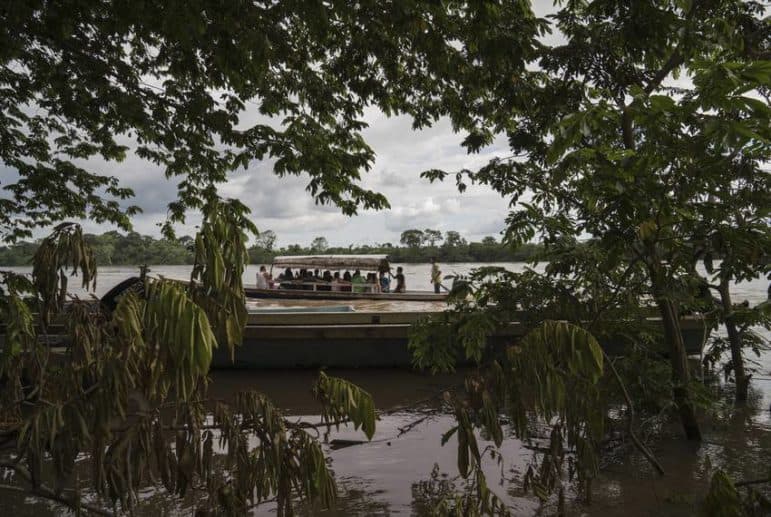
Verónica G. Cárdenas / for TIME
Migrants cross the Usumacinta River between La Técnica, Guatemala, and Frontera Corozal, México, on Oct. 21. The Usumacinta River acts as a border between the two countries. There is no immigration inspection in either of the two borders in the area.
In a move that will likely prompt legal challenges, President Donald Trump’s administration announced Thursday that the Department of Homeland Security will implement a new policy that will bar people from seeking asylum if they enter the country illegally between ports of entry.
The interim rule change will be published Friday in the Federal Register.
“The interim rule, if applied to a proclamation suspending the entry of aliens who cross the southern border unlawfully, would bar such aliens from eligibility for asylum and thereby channel inadmissible aliens to ports of entry, where they would be processed in a controlled, orderly, and lawful manner,” the notice reads.
The proclamation comes as a caravan of Central American migrants continues to make its way to the United States, although the crowd has decreased in size by thousands since beginning its journey last month.
During a conference call Thursday with reporters, administration officials said the president has the right to invoke such measures by proclamation under the Immigration and Nationality Act if the president “finds that the entry of any aliens … into the United States would be detrimental to the interests of the United States.”
The official said the administration’s proposal uses the same authority that the U.S. Supreme Court upheld in Trump v. Hawaii, the case that involved the 2017 travel ban.
But the rule is likely to be tested in court. Current law states that even undocumented immigrants who cross between the ports of entry are allowed to ask for asylum if they tell authorities they have a credible fear of returning to their home countries.
Tom Jawetz, the vice president of the immigration policy at the progressive Center for American Progress, said the rule change flies in the face of the protections immigrants have had in this country for decades and is being fast-tracked to suit the president’s agenda.
“In addition to violating the plain text of the Immigration and Nationality Act, which guarantees people the right to seek asylum ‘whether or not at a designated port of arrival,’ the administration decision to bypass the required notice and comment process is wholly without ‘good cause,'” he said in a statement.
Administration officials said the change announced Thursday was only one part of the White House’s effort to curb asylum applications and illegal immigration into the country, and it will look to craft other measures in the future.
“We are looking at a number of possibilities, at a number of legal options,” an administration official said. “We are working to ensure that the border does become secure. This is one effort, this is one option.”
The new rule could swell the number of migrants who have already been forced to camp out on the international bridges while they wait to seek asylum. On bridges across the Texas-Mexico border, migrants have been waiting, at times for days, after Customs and Border Protection officials tell the undocumented immigrants they have no space to hold the immigrants, leading some to stay on the bridge and wait and others to return to Mexico to bide their time.
Denise Gilman, director of the immigration law clinic at the University of Texas at Austin, said the policy could also allow the government to more quickly deport migrants who have crossed the border illegally.
If these migrants are automatically denied asylum, Gilman said, officials may be able to avoid putting them through lengthy proceedings in backlogged immigration courts. Because of crammed detention centers and restrictions on detaining children, many migrants are released before a decision on their asylum claim is made.
“Part of the goal may be to cycle people through as quickly as possible,” she said.
The announcement is the latest in a series of aggressive steps on immigration that began weeks before Tuesday’s midterm elections. The administration announced late last month it was deploying thousands of active-duty military troops to the southern border in response to what Trump and other Republicans have called an “invasion” by the Central Americans.
Administration officials on Thursday did not discuss what role, if any, the military would play after the new rule is implemented, but officials have stated before that the soldiers would serve to assist Customs and Border Protection and other federal agents in their border-security mission.
On Tuesday, the Border Patrol in El Paso postponed a planned “crowd control” exercise, which the agency said was due to “inaccurate reporting that caused unneeded confusion in border communities.” On Thursday, the Border Patrol announced it would hold the exercise on Friday. The exercise will be closed to the media and to the public.
Teo Armus contributed reporting.
